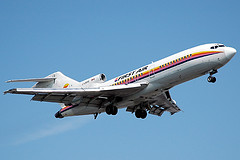Doctor in the air
 Doctor in the air
Doctor in the airIs there a doctor on board? If you're feeling ill, recovering from an operation or pregnant, think before you fly.
Boarding a giant metal structure that flies can seem precarious at the best of times. But to need urgent medical attention suddenly at 35,000ft above the ground can be a terrifying experience.
Just ask Nicola Delemere, 31, from Scunthorpe. Her waters broke on a plane en route to Crete from Manchester in April.
With the help of air stewardess Carol Miller, Aide was born three months prematurely,
weighing only lib loz, while the plane was over Dusseldorf. His breathing was so poor
that the quick-thinking Miller had to use a drinking straw to inflate his lungs and then
perform mouth-to-mouth and heart massage until the diverted plane landed at Gatwick
(the Delemeres did not want any publicity about their son's birth until doctors consid-
ered his condition safe).
Little Aifie's mid-air drama had a happy ending. There was a less pleasant experience
for Paul Trinder, a businessman who had paid pounds 4,000 to travel first class with BA
from London to Delhi.
He woke up mid-flight to find a corpse sitting near him. The woman in her 70s had died after takeoff and crew had stowed the body in a seat.in order to give the grieving family some privacy.
"Medical incidents on aeroplanes are pretty common," says Dr Richard Dawood, who specialises in travel medicine. "I have been called upon on planes countless times, though luckily for nothing too serious."
Airlines say they do not publish specific numbers of medical incidents on board because the term covers everything from a dizzy spell to a heart attack. British Airways
estimates that it has between 40 and 50 serious emergencies that require a plane to be
diverted each yeau
"It's very rare for a complaint to be so serious that the plane has to be diverted." says
Dr Dawood. "And the provisions for medical emergencies are a lot better than they were
a few years ago. Defibrillators have only become the norm in the last decade."
Many airlines have started to use technology that allows them to speak to"telemedical"
centres on the ground. The biggest of these is MedLink, which is based in Arizona and used by nearly 80 airlines.
Their support staff can converse in 140 languages and are able to give expert medical
advice, as well as identify the nearest airports with hospitals close by.
But the level of medical apparatus on board varies from carrier to carrier. 'q'here is obviously going to be more equipment on a longhaul than a short-haul flight," says Dawood. "and you will probably be better cared for travelling on a premium airline than a budget oue."
Yet recently there have been disturbing cases that raise many questions. In September last year, a 25-year-old Italian woman died on a Ryanair flight from Venice after suffering a blood clot on the lungs: a doctor who tried to treat her claimed that there wasn't basic medical equipment on board (Ryanair say they are now reviewing their procedures).
And in 1995 one British doctor on a longhaul flight from Hong Kong had to operate on a woman with a collapsed lung with just a coat hanger, a water bottle and some Sellotape.
There is no law determining how much medical equipment a plane should carry, but
Dr Dawood says that airlines carry apparatus "because it's considered good practice, and
because nobodywants to be sued".
All cabin crew are now gwen basic first-aid instruction, with some airlines upping the
stakes considerably - for example, all Singapore Airlines' crew have been trained to deliver babies.
For those who are concerned about flying with medical conditions, a British Airways
spokesman says that "the phrase 'prevention is better than cure' applies".
The World Health Organisation recommends that you avoid flying if you have an ear, nose or sinus infection, or heart and lung conditions.
"Talk to your doctor if you have just had an operation, especially if it involved diagnostic use of gas as the cabin air pressure can cause it to expand. Anothercondition to watch out for is anaemia, as the decreased amount of oxygen in planes can cause hypoxia (a shortage of oxygen in the blood).
'As for pregnant women, they should avoid flying after their 36th week. or 32nd if they are expecting twins."
Otherwise it's best to sit back. relax, enjoy your flight.., and be reassured: if you're on a
large commercial plane, Dr Dawood says that there is a high statistical chance of there being a doctor on board.
In fact, reflect on the luck of one Ryanair passenger who required treatment during a flight to Dublin. When crew appealed for help, 15 hands were raised. It turned out that a large group on board were doctors going on a golfing break and one of them. Dr Punit
Ramrakha, even happened to be Tony Blair's heart specialist.
Labels: doctor


0 Comments:
Post a Comment
Links to this post:
Create a Link
<< Home